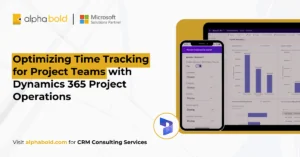Table of Contents
Executive Summary
Traditional CRM workflows, heavy with manual data entry, lead follow-ups, and constant system switching, are becoming growth blockers. Our work with more than 100 organizations across industries shows that these outdated practices waste time, introduce errors, and distract teams from building meaningful customer relationships.
CRM Task Automation powered by AI and Microsoft Power Platform changes this. By combining intelligent, context-aware automation with low-code flexibility, organizations can cut manual CRM tasks by up to 40% while improving the quality and consistency of customer engagement. AI learns from patterns, predicts outcomes, and acts autonomously, while Power Platform tools like Power Automate, AI Builder, Power Virtual Agents, and Power Apps allow business users to design and scale workflows without heavy IT involvement.
This guide explores why traditional CRM workflows hold businesses back, how AI-powered CRM automation works, and where it delivers the most impact, from lead qualification and email logging to case routing and predictive forecasting. It also includes real-world scenarios, a look at AlphaBOLD’s BUILDFitters AI integration, and a roadmap for evolving your CRM from a static record-keeping system into an intelligent business platform that drives measurable results.
The Problem with Traditional CRM Workflows
CRM is meant to help businesses manage relationships and interactions with customers and prospects. Over time, however, many systems have become weighed down by manual processes such as:
- Entering meeting notes
- Tracking email responses
- Updating opportunity statuses
- Assigning follow-up tasks
While these activities are necessary, they consume valuable time, introduce the risk of human error, and shift focus away from the customer. Instead of engaging with prospects or resolving issues, teams spend too much time on administrative work.
Basic automation can remove some of these tasks, but it often follows rigid rules and cannot adapt to real-world complexity. To truly transform productivity, businesses need intelligent automation that understands context, reacts in real time, and operates with minimal oversight.
What Makes AI-Powered CRM Automation Different?
When AI is integrated into CRM workflows, it goes beyond simply following predefined rules. It learns from patterns, predicts outcomes, and makes informed decisions based on real data.
Combined with Microsoft Power Platform’s low-code, user-friendly capabilities, this approach creates an automation model that is agile, scalable, and effective across multiple business functions.
Key advantages include:
- Contextual awareness: AI interprets customer behavior, sentiment, and buying intent to guide the following best action.
- Speed: Follow-ups that once took hours happen instantly.
- Consistency: Every customer receives the same quality of engagement, with no missed follow-ups or delays.
- Accuracy: AI minimizes errors in data entry, lead scoring, and customer categorization.
Reducing Manual Effort in CRM Workflows
One of the most tangible benefits of AI-powered CRM task automation is the ability to remove repetitive work from daily operations. Whether in sales, service, or marketing, AI and Microsoft Power Platform allow teams to automate a wide range of routine tasks, freeing employees to focus on higher-value activities.
Examples include:
- Lead qualification: AI models automatically assess lead quality and assign priority.
- Email logging: Emails are tracked and categorized without manual input.
- Task creation: Follow-up tasks are triggered automatically based on customer actions or set schedules.
- Case routing: Support requests are assigned to the most suitable agent based on expertise and availability.
Instead of increasing headcount to handle workload spikes, CRM task automation enables businesses to scale operations efficiently while maintaining service quality.
You may also like: Dynamics 365: Designed to Eliminate CRM Adoption Challenges
The Role of Microsoft Power Platform
Microsoft Power Platform makes intelligent CRM task automation accessible to business users, not just developers. Its drag-and-drop tools, built-in connectors, and AI capabilities allow teams to design and deploy workflows that fit their processes without heavy coding or IT involvement.
How Each Component Supports CRM Task Automation
- Power Automate: Automates repetitive tasks, triggers workflows across systems, and integrates your CRM with other business tools.
- AI Builder: Adds intelligence to workflows with features such as form recognition, sentiment analysis, and outcome prediction.
- Power Virtual Agents: Enables the creation of AI chatbots to handle routine inquiries or qualify leads.
- Power Apps: Supports the development of custom CRM apps tailored to internal processes and specific use cases.
These tools help teams:
- Respond faster to customer needs
- Standardize processes for consistency
- Reduce reliance on custom development
By combining AI with Power Platform, organizations can implement automation that scales easily, adapts to change, and delivers measurable results across CRM workflows.
Struggling to Get Value from Your Dynamics 365 CRM?
We help you streamline workflows, reduce manual tasks, and integrate AI-driven CRM task automation using Microsoft Power Platform without disrupting your existing processes.
Request a DemoBoosting Accuracy Through AI-Driven Decisions
Data accuracy is critical to making informed business decisions, yet manual CRM processes often introduce errors and inconsistencies. AI addresses this by validating real-time data, identifying duplicates, and flagging anomalies before they impact operations.
It also supports predictive forecasting, giving teams clearer insights into customer trends, sales pipelines, and service performance. Organizations can plan proactively, reduce surprises, and act more confidently with more reliable data.
You may also like: How to select the right CRM for your small business?
Real-World Scenarios Where AI Meets Power Platform
AI and Microsoft Power Platform work together to transform CRM workflows across industries and use cases. From sales and marketing to specialized sectors like architecture, engineering, and construction, these capabilities adapt to the unique demands of each business.
- Sales: When a high-priority lead revisits the pricing page, the system sends an automated email and creates a follow-up task for the sales rep, all without manual input.
- Marketing: AI reviews past campaign performance to predict which content will engage a specific customer segment. Based on these insights, Power Automate sends tailored newsletters.
- Customer Service: A chatbot built in Power Virtual Agents answers common questions instantly. If it detects frustration in the customer’s language, it automatically escalates the issue to a live agent and creates a CRM record.
These examples show intelligent task management, which saves time, improves accuracy, and delivers consistent customer experience. Later in this guide, we will explore how AlphaBOLD’s BUILDFitters solution brings the same AI and automation capabilities to AEC project management.
AI Integration in BUILDFitters – Extending CRM Automation to Project Management
BUILDFitters is AlphaBOLD’s AEC solution built on Dynamics 365 and Microsoft Power Platform. It applies the same AI-driven automation principles that enhance CRM workflows to the complexities of project management, creating a unified platform for customer, project, and operational data.
AI Agents in BUILDFitters
- Automated Reporting Agent: Generates real-time, accurate reports without manual data entry, improving project visibility.
- Resource Allocation Optimization Agent: Matches resources to project needs using AI analysis of requirements, availability, and skill sets.
- Predictive Analytics Agent: Uses historical project data to forecast timelines, costs, and potential risks for proactive decision-making.
- Data Access Control Agent: This agent applies role-based security rules to protect sensitive information while ensuring the right people have the right access.
By combining CRM data with AI-enabled project management capabilities, BUILDFitters helps AEC organizations track customer interactions, manage resources, and deliver projects accurately and efficiently within the Microsoft ecosystem.
Future Endeavors
AI and automation are advancing rapidly. Capabilities such as natural language processing, generative AI, and contextual recommendations are becoming more sophisticated, enabling CRM systems to shift from record-keeping to intelligent platforms for insight and action.
As these technologies mature, organizations can expect:
- Faster task execution across departments
- Predictive intelligence for strategy and decision-making
- More personalized and consistent customer engagement
- Deeper integration between CRM, project management, and industry-specific tools
Within the Microsoft ecosystem, AI will increasingly unify CRM, project operations, and specialized solutions like AlphaBOLD’s BUILDFitters, creating a single, connected environment for data-driven growth.
Businesses that adopt these innovations now will be better equipped to:
- Respond quickly to market changes
- Deliver exceptional customer experiences
- Scale operations with greater efficiency
Already Using Dynamics 365 CRM? Let's Optimize It
Whether underutilizing features or dealing with disconnected workflows, our expert team can help you build scalable, intelligent CRM processes on the Microsoft stack.
Request a ConsultationFrequently Asked Questions
Q: How long does it typically take to implement AI-powered CRM automation?
A: Timelines vary based on complexity and existing systems. Most organizations see initial automation benefits within 4 to 6 weeks, with full AI integration completed in 3 to 4 months. Our phased approach minimizes business disruption while delivering incremental value.
Q: Do we need technical expertise to manage AI-powered CRM automation?
A: No. Microsoft Power Platform is built for business users. Our consulting approach includes comprehensive training so your team can manage and modify workflows using intuitive, low-code tools. Technical complexity is handled by the platform, not your staff.
Q: What is the typical ROI for AI-powered CRM automation?
A: Clients typically see a 25 to 40 percent reduction in manual CRM tasks within the first six months. This translates to significant cost savings and productivity gains, with many achieving ROI within 8 to 12 months through improved efficiency and enhanced customer engagement.
Q: Can AI automation integrate with our existing CRM system?
A: Yes. Microsoft Power Platform connects with virtually all major CRM systems, including Salesforce, HubSpot, and custom solutions. We create seamless integrations that enhance your current technology investments rather than replacing them.
Q: How does AI ensure data privacy and security in CRM automation?
A: Microsoft Power Platform includes enterprise-grade security features, compliance certifications, and data governance tools. AI models operate within your organization’s security framework, ensuring customer data remains protected while enabling intelligent automation.
Conclusion
CRM task automation powered by AI and Microsoft Power Platform is no longer a future trend; it is a present-day competitive advantage. By replacing repetitive, manual processes with intelligent, context-aware automation, organizations can improve data accuracy, accelerate workflows, and deliver more meaningful customer interactions.
From streamlining sales follow-ups to enhancing project management through solutions like AlphaBOLD’s BUILDFitters, the opportunities to integrate AI across business operations are expanding rapidly. Companies that act now will gain the efficiency, agility, and insight needed to drive measurable growth.








